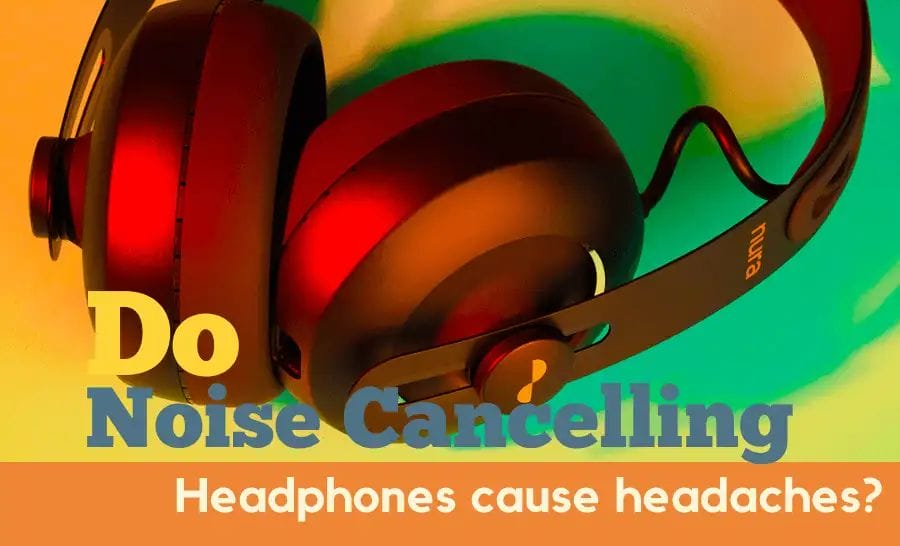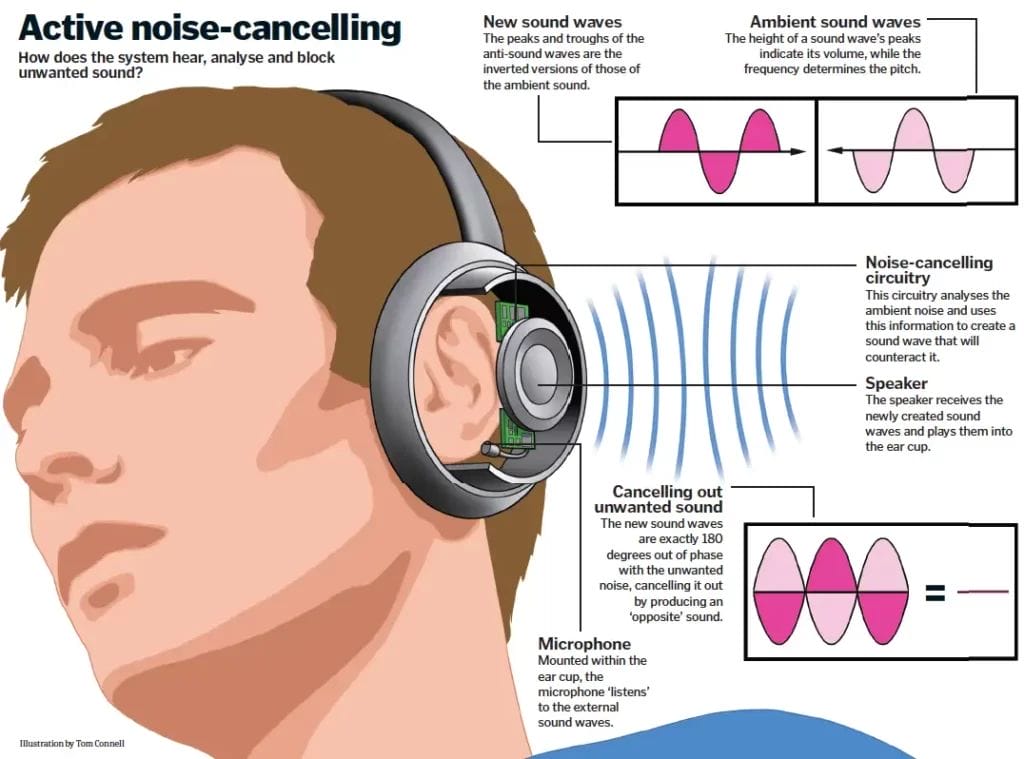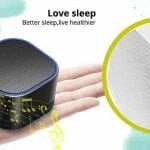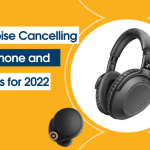As an affiliate, we may receive commissions from purchases made via our links at no additional cost to you.
Noise-canceling headphones are ideal for focusing completely on your audio or podcast without the need for exterior sounds to ruin the ambience. If you’re considering getting a pair of noise cancelling, you might be unsure about whether they’ll cause headaches.
First of all, it’s important to understand why people might experience headaches when using noise cancelling headphones. One potential reason is that the headphones can actually increase the overall level of noise in your environment. This can be especially problematic for people who are already sensitive to sound, as it can lead to a more severe headache.
Another possibility is that the active noise cancellation process can be jarring for some people’s ears.
Here, I’ll explain why wearing noise-canceling headsets may cause headaches and if it’s bad for you to wear them the whole time. If you’re going to wear noise-cancelling headphones, I’ll also explain whether they can hurt your ears and whether there’s anything you can to prevent headaches while wearing the headphones.
Why Does My Head Hurt With Noise Cancelling?
Noise cancelling headphones are a popular way to reduce environmental noise and distractions. But for some people, wearing these headphones can actually contribute to a headache. Recent research suggests that this is because noise cancelling headphones work by using active noise reduction (ANR) technology to create an antisound wave that cancels out the sound you’re trying to avoid. This can be effective in reducing noise levels, but it can also put stress on your ears and lead to discomfort or pain.
Read more: Best Noise Cancelling Headphones and Earbuds for 2024
How Headphones’ Noise-Canceling Mechanism works?
Headphones have become a staple in everyday life, used for everything from listening to music on the go to cancelling out the noise of a busy office. But how do headphones work? We will explore the basics of a headphones’ noise-cancelling mechanism and why it’s important.
Noise-canceling headphones can work in two ways to remove the background noise. The first way is by using an electronic filter to block out the sound. The second way is by using a microphone to pick up the sound and then play it back out of the headphones at a lower volume. This method is called “phase cancellation.
First, it’s important to understand what noise-cancellation is. Noise-cancellation is the process of reducing or eliminating unwanted sound waves. In the context of headphones, this means that the headphones create their own sound waves that are opposite in phase to the ambient sound waves, thereby cancelling them out.
There are two main types of noise-cancellation: passive and active. Passive noise-cancellation is achieved by using materials that absorb sound, such as earplugs or foam pads on headphones.
1. What is passive noise-cancellations?
Passive noise-cancellation is a technology used in headphones and other audio devices to reduce or completely eliminate environmental noise. It works by using microphones to pick up outside sound, then processing and playing back an inverted sound wave that cancels out the original noise. This is done without any input from the user, making it a passive process. Passive noise-cancellation is often found in high-end headphones, as well as products aimed at reducing environmental noise in places like offices and airplanes.
2. What is active noise-cancellation?
Active noise-cancellation is a process that uses inverse waves to eliminate any unwanted sound. The technology has been used in headphones for a few years now, but there are also active noise-cancelling earbuds on the market. These earbuds have tiny microphones that pick up ambient noise and then create inverse waves to cancel it out. This process is what helps to drown out the sound of traffic, airplane engines, and other unwanted noises.
The Headphones’ High Volume cause headaches?
Some people who listen to music on their headphones at high volumes can experience headaches. The cause of the headaches is not yet known, but some experts believe that it has to do with the way the headphones create pressure on the head. Other experts believe that it has to do with the way sound waves are transmitted through the air and then into the ear drum. Until more is known, people who experience headaches when listening to music on headphones should avoid doing so at high volumes.
Noise-canceling headphones are a great way to enjoy listening to your favorite music at a high volume.
Unfortunately, listening to loud music or content can hurt your head. Listening to loud sounds through headphones can make the superficial blood vessels in your head widen, and these dilated blood vessels can put pressure on the skull’s trigeminal sensory nerve fibers, which respond by releasing proteins to cause a headache.
If you get migraines often, it might be best to lower the volume, as listening to high-volume content with your noise-canceling headphones can trigger a migraine.
Lowering the volume is an easy way to prevent headaches from listening to loud content through your noise-canceling headphones. It might be worth trying, as listening to long-term use loud music can cause hearing loss.
The tight Headphone Band cause headaches?
If you’re like most people, you probably enjoy listening to music or watching TV shows and movies on your laptop or phone. But have you ever gotten a compression headache from wearing headphones too tight? You’re not alone.
Studies show that the tight headphone band can cause headaches in some people. In fact, it’s one of the most common causes of headaches among people who wear headphones.
The main reason why the tight headphone band causes headaches is because it puts pressure wave on your temples. This pressure can cause pain and tension in your head and neck, which can lead to a headache.
If you tend to get headaches from wearing headphones, try using a looser band or adjusting the size of the ear cups so they fit more comfortably on your ears. You may also want to take breaks from listening to music or watching TV shows and movies every 30 minutes or so.
Wearing noise cancelling headphones all day
Noise-cancelling headphones are a recent invention that have become very popular. They are headphones that have a special ability to cancel out noise, which is why they are often used on airplanes. Noise-cancelling headphones are a popular way to reduce the amount of noise in your environment. However, there is some speculation that wearing them for long periods of time can have negative effects on your health complications.
Some experts say that wearing noise-cancelling headphones for too long can lead to temporary hearing loss, ringing in the ears, and even headaches.
But, if you’re not careful, they can also give you headaches or earaches. Here are a few tips to make sure your headphones don’t give you any trouble:
- Make sure your headphones fit properly. If they’re too tight, they can put pressure on your ears and give you a headache.
- Don’t listen to music too loudly. You might not realize it, but noise-cancelling headphones can actually amplify the sound of music, which can cause hearing damage over time.
- Take breaks every hour or so. Your ears need time to rest and if you don’t take breaks, you might start to experience pain or discomfort.
However, they can be dangerous if you’re driving or outside jogging. If you can’t hear the sound of cars or people around you, you could get into a dangerous situation without realizing it. In addition, wearing noise-cancelling headphones can actually make it harder to focus on your music because you’re not getting any outside noise to help with the rhythm. Try using earbuds instead of headphones when you’re in a noisy environment.
Does Noise-Cancelling Hurt Your Ears?
Noise-cancelling headphones have become increasingly popular in recent years, as they promise to reduce the amount of ambient noise that reaches the listener’s ears. This is accomplished by using tiny microphones to pick up any unwanted sound, which is then played back out of phase by the headphones, essentially cancelling out the noise. While this can be an immensely helpful feature for those who need to focus in a noisy environment, such as on a busy street or during a flight, some people are concerned that using noise-cancelling headphones for extended periods of time may actually be harmful to their hearing.
A study published in the journal “PLoS One” in 2018 looked at the effects of noise-cancelling headphones on the inner ear and found that they may cause damage to the cells in the ear that help with hearing.
Noise-Cancelling Headphones Can Cause Pressure Pain
If you’ve ever worn noise-cancelling headphones for an extended period of time, you may have experienced a weird, pulsing sensation in your ears. This is called pressure pain, and it’s a common side effect of wearing tight-fitting earpieces.
Pressure pain is caused by the increased pressure on the eardrum that can be exerted by earpieces that are too tight. This pressure can cause the eardrum to move in ways that it normally wouldn’t, which can lead to pain and discomfort.
The good news is that pressure pain is usually temporary and goes away once you remove the headphones. However, if you experience this type of pain regularly, it’s best to speak with your doctor to see if there’s a better option for you when it comes to noise-cancelling headphones.
Noise-Cancelling Headphones Can Cause TMJ Disorder
Noise-cancelling headphones are headphones that use electronic circuitry to reduce or eliminate ambient noise. Many people enjoy using these headphones because they can provide a quieter listening experience. However, there is a potential downside to using noise-cancelling headphones – they can cause TMJ disorder.
TMJ disorder is a condition that affects the temporomandibular joint, which is the joint that connects the lower jawbone (temporal bone) to the skull (jaw Pain). This joint is responsible for movements like biting and chewing, and TMJ disorder can cause pain and dysfunction in this area. One possible cause of TMJ disorder is exposure to loud noises, and it’s thought that using noise-cancelling headphones can add to this exposure and increase the risk of developing TMJ disorder.
Can noise cancelling headphones cause tinnitus
It’s been estimated that around 50 million Americans experience some level of tinnitus, a condition characterized by ringing, buzzing, or other phantom noises in the ears. While there are a variety of potential causes, one common culprit is exposure to loud noise. And now there’s another reason to be careful about how much noise you’re exposed to: recent research suggests that using noise-cancelling headphones may increase your risk of developing tinnitus.
The study, which was published in the journal JAMA Otolaryngology-Head and Neck Surgery, looked at data from more than 200 participants who had experienced tinnitus for at least six months. The researchers found that those who used noise-cancelling headphones were more likely to report worse symptoms of tinnitus than those who didn’t use them.
Noise-Cancelling Headphones Can Cause Listener Fatigue
Noise-cancelling headphones are a popular way to enjoy audio content without the interruption of outside noise. However, a recent study has shown that these headphones can cause listener fatigue if used for extended periods of time. The study, which was conducted by the University of Southampton in the United Kingdom, found that noise-cancelling headphones can create an “acoustic masking” effect that makes it difficult for listeners to concentrate on other tasks. As a result, using noise-cancelling headphones for more than two hours can lead to decreased focus and productivity.
Noise-Cancelling Headphones Can Increase Sound Pressure
Noise-cancelling headphones are marketed as a way to reduce the amount of external noise that enters your ears. But a recent study found that when noise-cancelling headphones are turned up to their highest setting and they have powerful and effective speakers , they can actually increase sound pressure levels by up to 9 decibels. This increase in sound pressure can be harmful to your hearing over time. This increase in sound pressure may be harmful to the user’s hearing over time.
Noise-Cancelling Headphones Can Cause Ear Infections
If you use headphones frequently, If so, it’s important to keep the earpieces clean. Bacteria can build up on them over time and lead to an infection. To prevent this from happening, wash your headphones’ earpieces regularly with soap and water.
You may also want to consider using headphones that have a built-in guard against bacteria. These headphones have been treated with a special coating that helps kill bacteria and prevents them from growing on the earpieces.
Ear infections are a common ailment, especially among children. They can be caused by a variety of factors, including viruses, bacteria, and environmental irritants. In some cases, actual ear canal infections may be caused by bacteria on your headphones’ earpieces.
Published in the journal JAMA Otolaryngology-Head and Neck Surgery, found that noise-cancelling headphones can create an environment that is more conducive to ear infections. The researchers looked at data from more than 1,000 patients who had been treated for an ear infection and found that those who had been using noise-cancelling headphones were more likely to have an infection.
Can Noise Cancelling Headphones Cause Nausea?
There is much debate over whether or not noise cancelling headphones can cause nausea. Some people say that the pressure changes caused by the headphones can lead to motion sickness, while others believe that it is the noise cancellation itself that makes people feel ill.
A study conducted at Cornell University found that out of the 27 participants, 13 reported feeling nauseous after using the headphones. However, a study conducted by the National Center for Biotechnology Information found that there was no significant difference in symptoms between those who wore noise cancelling headphones and those who didn’t. So, what is the truth?
Can Noise Cancelling Headphones Cause Vertigo?
Noise cancelling headphones are headphones that have a built-in microphone which detects and analyses ambient noise. This noise is then electronically cancelled out, resulting in a quieter listening experience. However, for some people, these headphones can cause vertigo. Vertigo is a sensation of spinning or rotation, and it can be very uncomfortable and distracting. For most people, the vertigo caused by noise-cancelling headphones is mild and goes away after a short time. However, for some people, the vertigo can be severe and persistent. If you experience vertigo when using noise-cancelling headphones, it is important to stop using them and consult your doctor.
Final Thought
Can noise cancelling headphones cause headaches? Some people believe that they do, while others say that they don’t. It’s a common complaint among those who use them, but it’s not clear whether or not the headphones are actually to blame. In fact, there’s no concrete evidence to suggest that the devices are necessarily harmful.
Some people believe that the sound waves created by noise cancelling headphones can interfere with your brainwaves and cause headaches. However, this theory has yet to be confirmed.
A study published in the journal Audiology looked at this question and found that using noise cancelling headphones does not cause more headaches than regular headphones. However, the study did find that people who are prone to headaches should avoid using noise cancelling headphones if possible because they can make them worse.









